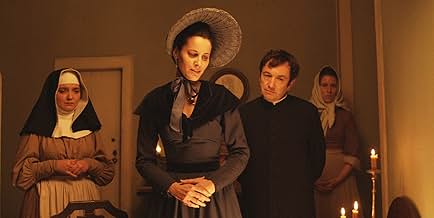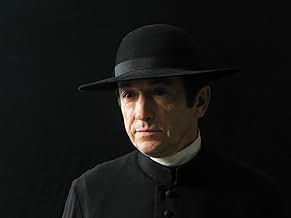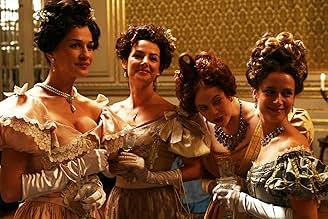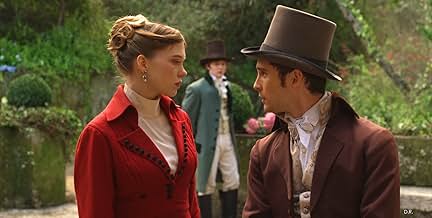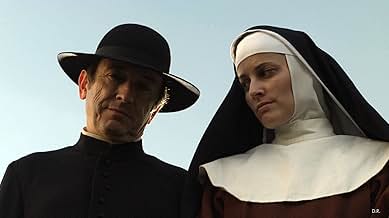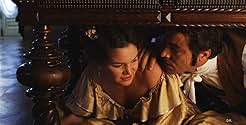VALUTAZIONE IMDb
7,4/10
3646
LA TUA VALUTAZIONE
Aggiungi una trama nella tua linguaFollows a jealous countess, a wealthy businessman, and a young orphaned boy across Portugal, France, Italy and Brazil where they connect with a variety of mysterious individuals.Follows a jealous countess, a wealthy businessman, and a young orphaned boy across Portugal, France, Italy and Brazil where they connect with a variety of mysterious individuals.Follows a jealous countess, a wealthy businessman, and a young orphaned boy across Portugal, France, Italy and Brazil where they connect with a variety of mysterious individuals.
Sfoglia gli episodi
Recensioni in evidenza
Mysteries of Lisbon in my view is utterly mesmerising, and one of those rare cases where there is no bad thing about it. As an adaptation of the novel, it succeeds wonderfully, on its own terms it is even more impressive. Mysteries of Lisbon may be lengthy at just over four and a half hours. But because everything was so well done, there was not a single moment where I was not transfixed.
On a visual standpoint, Mysteries of Lisbon looks amazing. The photography is gorgeous complete with beautiful-looking scenery and costumes, while there is an atmospheric and striking colour palette. The music does a fine job in conveying the mood of each scene, with not one scene feeling musically out of place.
Mysteries of Lisbon also benefits from a brilliant story. There are several story lines developed (very well) and incorporated throughout, but the main crux of the story told here is so unique and compelling it drew me in immediately. The script is of exceptional quality, often very moving, literate and thoughtful, while the characters have a complexity while being intriguing as well.
When it comes to the acting, there is not a single bad performance, Luz especially in the lead is fantastic. And throughout the direction is superb. Overall, this is mesmerising and highly recommended. 10/10 Bethany Cox
On a visual standpoint, Mysteries of Lisbon looks amazing. The photography is gorgeous complete with beautiful-looking scenery and costumes, while there is an atmospheric and striking colour palette. The music does a fine job in conveying the mood of each scene, with not one scene feeling musically out of place.
Mysteries of Lisbon also benefits from a brilliant story. There are several story lines developed (very well) and incorporated throughout, but the main crux of the story told here is so unique and compelling it drew me in immediately. The script is of exceptional quality, often very moving, literate and thoughtful, while the characters have a complexity while being intriguing as well.
When it comes to the acting, there is not a single bad performance, Luz especially in the lead is fantastic. And throughout the direction is superb. Overall, this is mesmerising and highly recommended. 10/10 Bethany Cox
At four and one-half hours, this is the longest movie I have seen in quite some time. The length will most definitely detract many (as would the costumes and subtitles) from ever sitting down to view this; but I think those with patience and appreciation of "epic"/sweeping storytelling might like this one.
This is the story of Joao, a young orphaned boy (he discovers he's actually a bastard as the story unfolds) living in a Catholic orphanage under the watchful, caring eye of Father Denis. Joao learns of his parentage and where they came from and their circumstances ... and as those stories unfold we learn of different characters in THOSE stories as well.
The film spirals and sweeps and sways with several tangents and characters; but I found it all interesting and actually wanted to continue watching. That each of the stories intertwine and circle each other is part of the "mystery" of the title and parts of the film act and feel as if the entire production is a dream.
It is lovely to look at (gorgeous costumes and sets) and each of the characters has a revelation that continues the "mystery" and the intrigue and drama. The story travels from the streets of Lisbon to Venice to France to Tunis and to Brazil ... it is SWEEPING on a grand-scale as it also spans three decades.
Based on the late author, Camilo Castelo Branco's (who shot himself at the age of 70 b/c he was going blind) novel of the same name, Chilean director Raoul Ruiz has given us his final film (it is masterful) as he died shortly before the film began screening. That it is all so tragic and doomed and romantic is fitting ... as that is exactly what the movie gives its viewer.
I know none of my friends will give this one a shot ... it does require patience. But it is a beauty.
This is the story of Joao, a young orphaned boy (he discovers he's actually a bastard as the story unfolds) living in a Catholic orphanage under the watchful, caring eye of Father Denis. Joao learns of his parentage and where they came from and their circumstances ... and as those stories unfold we learn of different characters in THOSE stories as well.
The film spirals and sweeps and sways with several tangents and characters; but I found it all interesting and actually wanted to continue watching. That each of the stories intertwine and circle each other is part of the "mystery" of the title and parts of the film act and feel as if the entire production is a dream.
It is lovely to look at (gorgeous costumes and sets) and each of the characters has a revelation that continues the "mystery" and the intrigue and drama. The story travels from the streets of Lisbon to Venice to France to Tunis and to Brazil ... it is SWEEPING on a grand-scale as it also spans three decades.
Based on the late author, Camilo Castelo Branco's (who shot himself at the age of 70 b/c he was going blind) novel of the same name, Chilean director Raoul Ruiz has given us his final film (it is masterful) as he died shortly before the film began screening. That it is all so tragic and doomed and romantic is fitting ... as that is exactly what the movie gives its viewer.
I know none of my friends will give this one a shot ... it does require patience. But it is a beauty.
Mistérios de Lisboa is shown in the United States with the title Mysteries of Lisbon (2010). The film is directed by the extraordinary Chilean director, Raoul Ruiz. Ruiz, who died in 2011, had directed 115 films. (Not a typo--one hundred and fifteen.)
The film is based on a novel by the Portuguese author Camilo Castelo Branco. (Unfortunately, the novel isn't available in English translation.) It's also frustrating that the DVD available in the U.S. is a shortened version of the original miniseries. (266 minutes vs. 360 minutes. What was left out of the shorter version?)
The film is hard to describe because there are stories within stories within stories. The basic plot--more or less--revolves around a boy attending a Catholic school in early 19th Century Portugal. The boy doesn't know the identity of his mother and father. He doesn't even know his last name.
We eventually meet his mother, her husband, and--in flashback--his father. We also meet elegant women in sumptuous gowns, men for whom dueling is a way of life, and endless numbers of servants who are always watching and listening.
Some mysteries are never resolved. For example, there's a young woman who is the mistress of one of the nobles. When he dies, she refuses to accept any of his inheritance. She turns up again as the wife of an extremely wealthy, cruel man. Then she disappears from the plot. (Was her story edited out, or did she just disappear?)
Ultimately, I think the key to the plot is the priest Padre Dinis, played extremely well by Adriano Luz. He--like almost all of the the characters--turns out to have a surprising past.
Other IMDb reviewers have commented on the costumes, which are incredibly attractive. Two main characters who appear in those costumes are Maria João Bastos as a Portuguese noblewoman and Clotilde Hesme as a French noblewoman. Both of them are extremely beautiful in a European, non-Hollywood way. They appear to have been born to wear those costumes.
At the very end of the movie the young man, now grown, encounters some beggars. One of them tells him, "With the nobility, it's all about their honor. We poor people know these things happen, and we take them as part of life." When I thought about it, those sentences encompasses Mysteries of Lisbon. Nobles fight duels and spend endless effort and resources to protect the honor of their family. One man goes so far as to order the killing of his grandchild, because the child is born out of wedlock. Huge events are taking place around them--the Napoleonic wars, the Portuguese civil war--but what really matters is their rigid code of honor.
We saw this movie on DVD, and it worked well enough. However, almost every frame of the film would be a beautiful still. Many scenes look like lush paintings--Baroque, rather than 19th Century. That's why I believe the film would work better on the large screen. However, if no screening is available, buy the DVD. It's not a movie you want to miss!
The film is based on a novel by the Portuguese author Camilo Castelo Branco. (Unfortunately, the novel isn't available in English translation.) It's also frustrating that the DVD available in the U.S. is a shortened version of the original miniseries. (266 minutes vs. 360 minutes. What was left out of the shorter version?)
The film is hard to describe because there are stories within stories within stories. The basic plot--more or less--revolves around a boy attending a Catholic school in early 19th Century Portugal. The boy doesn't know the identity of his mother and father. He doesn't even know his last name.
We eventually meet his mother, her husband, and--in flashback--his father. We also meet elegant women in sumptuous gowns, men for whom dueling is a way of life, and endless numbers of servants who are always watching and listening.
Some mysteries are never resolved. For example, there's a young woman who is the mistress of one of the nobles. When he dies, she refuses to accept any of his inheritance. She turns up again as the wife of an extremely wealthy, cruel man. Then she disappears from the plot. (Was her story edited out, or did she just disappear?)
Ultimately, I think the key to the plot is the priest Padre Dinis, played extremely well by Adriano Luz. He--like almost all of the the characters--turns out to have a surprising past.
Other IMDb reviewers have commented on the costumes, which are incredibly attractive. Two main characters who appear in those costumes are Maria João Bastos as a Portuguese noblewoman and Clotilde Hesme as a French noblewoman. Both of them are extremely beautiful in a European, non-Hollywood way. They appear to have been born to wear those costumes.
At the very end of the movie the young man, now grown, encounters some beggars. One of them tells him, "With the nobility, it's all about their honor. We poor people know these things happen, and we take them as part of life." When I thought about it, those sentences encompasses Mysteries of Lisbon. Nobles fight duels and spend endless effort and resources to protect the honor of their family. One man goes so far as to order the killing of his grandchild, because the child is born out of wedlock. Huge events are taking place around them--the Napoleonic wars, the Portuguese civil war--but what really matters is their rigid code of honor.
We saw this movie on DVD, and it worked well enough. However, almost every frame of the film would be a beautiful still. Many scenes look like lush paintings--Baroque, rather than 19th Century. That's why I believe the film would work better on the large screen. However, if no screening is available, buy the DVD. It's not a movie you want to miss!
10RMHolt77
MYSTERIES OF LISBON is a staggeringly immense epic, weaving together multiple narratives of operatic passion and desire into a broader memory-narrative patchwork. The late Raul Ruiz draws upon great predecessors to set the visual tone (there's plenty of Visconti's THE LEOPARD and Kubrick's BARRY LYNDON here), but then toys with the aesthetic by adding playfully surreal touches, so that the events seem perched on the edge of a dream. By design, it's all a bit messy, one narrative tumbling into the other, but Ruiz displays such complete mastery of the medium that MYSTERIES OF LISBON remains gripping, even over the course of its four-hour running time.
The word "masterpiece" is fairly overused, and as a result, devalued, but MYSTERIES OF LISBON is the real thing.
The word "masterpiece" is fairly overused, and as a result, devalued, but MYSTERIES OF LISBON is the real thing.
Well this is pretty exciting stuff, four and a half hours of Raoul Ruiz back on top form. It's an adaptation of an eponymous 19th century novel by Camilo Castelo-Branco, who is a very famous author in Portugal, the first professional Portuguese author. I think that Ruiz and Castelo-Branco may have been birds of a feather, both known for being extremely prolific artists, Castelo-Branco managed to produce over 260 books whilst this movie is Ruiz's 111th. Superficially one could compare the movie to Wojciech Has' The Saragossa Manuscript (1965) in the way, in the style of Scheherazade, stories generate out of one another. But I think, given the large level of inter-relationships between the stories (what's really being revealed is a web), a more apt comparison may be to Victor Hugo's Les Misérables.
This is quite a dark movie, it opens with the description that "this work is not my child, nor my godson... this work is a diary of suffering". The young narrator says, in comparison to the other children at the religious school he's at, "I never went on outings, nor had holidays, nor presents". His presence at the school and his identity is a mystery to him, he has no last name and is known only as "Joao". His story sprouts into others, which are generally to do with love. The movie is perverse in the extreme, there is a ball at one point in the movie which sums up the atmosphere, the musicians play weird lilting African lunduns for the guests to dance to, which is the latest fashion, along with the pointing of fingers, all the while the guests maliciously gossip. This is in marked contrast to the official Catholicism of Portugal, that one never really gets any sense of in the movie. Although ones honour and reputation may be lost by a single indiscreet kiss, honour is only a thing of extreme superficiality, to be seen as honourable is to be honourable.
The length to which love annihilates the characters in the movie is quite astonishing at times, and brought me to the brink of tears. The Duchess of Cliton is a case in point, a once innocent woman, who describes herself as "mechant", and breaks the hearts of men at will. At one point, she is manipulating a portly baron, who has been nothing but kind to her, and simply bursts out in laughter, revelling in her power. She has to leave the room and then come back. The baron is totally undeterred, just as the young man who Cliton tells she is a bad woman simply refuses to believe her. Her beauty gives her a halo and power that is sheerly wicked. There's also a lot of sexual jealousy in the movie too, and the fires of this jealousy are stoked to ruination, in a way which provokes awe.
There's a sense of romantic progression from early extreme romantic sentiments, pure love, which is shattered by heartbreak, and leads either to misery or to revenge, where the person who has had their heart broken becomes a heart breaker to regain their power. There's a kind of perversity to everything, people are always spying on events from a distance, and a place of extreme duplicity is described as a "temple to sincerity", which in a way it is.
My favourite scene perhaps is set in a grand room in the University of Lisbon, which, it is pretended, is the Portuguese embassy in Rome. Two seats are bought into a room that is bare except for the most magnificent frescoes, a conversation ensues in which one man declares his intention to withdraw from life, he is to take religious orders instead of performing a cowardly annihilation of his own body. At the end of the scene the conversant withdraws and the two chairs are taken away, the man is left with nothing but the frescoes, a metaphor for his memories, which are the only thing that remains for him of the world, he focuses on part of a fresco and collapses. This is how mise-en-scene should be! Ruiz got the director of photography to watch Time Regained and a couple of other Ruiz movies beforehand. This confirms to me a suspicion that Ruiz always maintains ultimate control over the look of the movie. Here it's all trademark shooting, with elements in the extreme foreground of the shot framing action in the background, or vice versa. The camera movements in the mostly interior scenes are also extremely intricate. It's a gorgeous looking movie. The bag of tricks comes out as well, at one point a painting comes to life when Joao looks at it, in a threatful shot that can only be described as gobsmacking.
The movie has a definite colour palette, all shades of gold mostly, with dark greens and greys, yeah it's a stunner.
There is a longer version at six hours that will shortly be screened on Portuguese television. Ruiz in fact prefers the cinema version because the TV version has to have it's tempo fiddled with so that each of the six episodes it splits into ends on something of a cliffhanger. There is also one very powerful scene included in the movie which is not on the TV series, this is where it is revealed what is behind the locked door of Father Dinis.
If you liked this, prepare yourself for more. Ruiz has declared the intention to make a sequel based on the Castelo-Branco novel "livro negro de Padre Dinis" (the black book of Father Dinis). Ruiz is unstoppable, he made this highly intricate and long movie in 14 weeks, during which time he underwent surgery! Mysteries of Lisbon is an extremely special and very significant movie.
This is quite a dark movie, it opens with the description that "this work is not my child, nor my godson... this work is a diary of suffering". The young narrator says, in comparison to the other children at the religious school he's at, "I never went on outings, nor had holidays, nor presents". His presence at the school and his identity is a mystery to him, he has no last name and is known only as "Joao". His story sprouts into others, which are generally to do with love. The movie is perverse in the extreme, there is a ball at one point in the movie which sums up the atmosphere, the musicians play weird lilting African lunduns for the guests to dance to, which is the latest fashion, along with the pointing of fingers, all the while the guests maliciously gossip. This is in marked contrast to the official Catholicism of Portugal, that one never really gets any sense of in the movie. Although ones honour and reputation may be lost by a single indiscreet kiss, honour is only a thing of extreme superficiality, to be seen as honourable is to be honourable.
The length to which love annihilates the characters in the movie is quite astonishing at times, and brought me to the brink of tears. The Duchess of Cliton is a case in point, a once innocent woman, who describes herself as "mechant", and breaks the hearts of men at will. At one point, she is manipulating a portly baron, who has been nothing but kind to her, and simply bursts out in laughter, revelling in her power. She has to leave the room and then come back. The baron is totally undeterred, just as the young man who Cliton tells she is a bad woman simply refuses to believe her. Her beauty gives her a halo and power that is sheerly wicked. There's also a lot of sexual jealousy in the movie too, and the fires of this jealousy are stoked to ruination, in a way which provokes awe.
There's a sense of romantic progression from early extreme romantic sentiments, pure love, which is shattered by heartbreak, and leads either to misery or to revenge, where the person who has had their heart broken becomes a heart breaker to regain their power. There's a kind of perversity to everything, people are always spying on events from a distance, and a place of extreme duplicity is described as a "temple to sincerity", which in a way it is.
My favourite scene perhaps is set in a grand room in the University of Lisbon, which, it is pretended, is the Portuguese embassy in Rome. Two seats are bought into a room that is bare except for the most magnificent frescoes, a conversation ensues in which one man declares his intention to withdraw from life, he is to take religious orders instead of performing a cowardly annihilation of his own body. At the end of the scene the conversant withdraws and the two chairs are taken away, the man is left with nothing but the frescoes, a metaphor for his memories, which are the only thing that remains for him of the world, he focuses on part of a fresco and collapses. This is how mise-en-scene should be! Ruiz got the director of photography to watch Time Regained and a couple of other Ruiz movies beforehand. This confirms to me a suspicion that Ruiz always maintains ultimate control over the look of the movie. Here it's all trademark shooting, with elements in the extreme foreground of the shot framing action in the background, or vice versa. The camera movements in the mostly interior scenes are also extremely intricate. It's a gorgeous looking movie. The bag of tricks comes out as well, at one point a painting comes to life when Joao looks at it, in a threatful shot that can only be described as gobsmacking.
The movie has a definite colour palette, all shades of gold mostly, with dark greens and greys, yeah it's a stunner.
There is a longer version at six hours that will shortly be screened on Portuguese television. Ruiz in fact prefers the cinema version because the TV version has to have it's tempo fiddled with so that each of the six episodes it splits into ends on something of a cliffhanger. There is also one very powerful scene included in the movie which is not on the TV series, this is where it is revealed what is behind the locked door of Father Dinis.
If you liked this, prepare yourself for more. Ruiz has declared the intention to make a sequel based on the Castelo-Branco novel "livro negro de Padre Dinis" (the black book of Father Dinis). Ruiz is unstoppable, he made this highly intricate and long movie in 14 weeks, during which time he underwent surgery! Mysteries of Lisbon is an extremely special and very significant movie.
Lo sapevi?
- BlooperThe movie is set during the late 1700's to early 1800's. During the ballroom scene, several shots make it obvious that the gowns worn by the women have zippers in the back but the zipper wasn't invented until 1851.
- Versioni alternativeAlso exists as a shorter (by about an hour), theatrically released, feature film version, Mistérios de Lisboa (2010).
- ConnessioniEdited from Mistérios de Lisboa (2010)
I più visti
Accedi per valutare e creare un elenco di titoli salvati per ottenere consigli personalizzati
- How many seasons does Mysteries of Lisbon have?Powered by Alexa
Dettagli
- Data di uscita
- Paesi di origine
- Siti ufficiali
- Lingue
- Celebre anche come
- I misteri di Lisbona
- Luoghi delle riprese
- Aziende produttrici
- Vedi altri crediti dell’azienda su IMDbPro
Contribuisci a questa pagina
Suggerisci una modifica o aggiungi i contenuti mancanti



